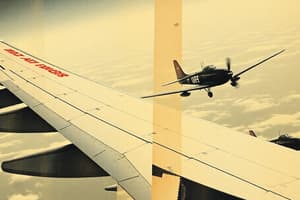Podcast
Questions and Answers
What is the function of an aileron?
What is the function of an aileron?
- To provide lift
- To generate thrust
- To control roll (correct)
- To regulate yaw
What does a rudder control?
What does a rudder control?
Yaw
What is the major horizontal surface on an airplane that provides lift?
What is the major horizontal surface on an airplane that provides lift?
Wing
The movable surfaces on a wing that increase lift during takeoff or landing are called ______.
The movable surfaces on a wing that increase lift during takeoff or landing are called ______.
What part of the plane allows it to go up and down?
What part of the plane allows it to go up and down?
What generates thrust on an aircraft?
What generates thrust on an aircraft?
What is the main body of an aircraft called?
What is the main body of an aircraft called?
Where does the pilot sit in an aircraft?
Where does the pilot sit in an aircraft?
What is the purpose of the horizontal stabilizer in an aircraft?
What is the purpose of the horizontal stabilizer in an aircraft?
What does the vertical stabilizer do?
What does the vertical stabilizer do?
Flashcards are hidden until you start studying
Study Notes
Aircraft Control Surfaces
- Aileron: Regulates an aircraft's roll, allowing for lateral movement during flight.
- Rudder: Located on the tail, it controls yaw, helping the aircraft turn left or right.
- Elevators: Found on the tail; they control the ascent and descent of the aircraft by changing its pitch.
Wing Structure
- Wing: The primary horizontal surface that provides lift, essential for flight.
- Flaps: Movable surfaces attached to the wings' leading and trailing edges; extending them increases lift during takeoff and landing, while retracting reduces drag during high-speed flight.
Airframe Components
- Fuselage: The main body of the aircraft, housing passengers, cargo, and various systems.
- Horizontal Stabilizer: An airfoil positioned at the rear, stabilizing the aircraft and preventing vertical oscillations.
- Vertical Stabilizer: Positioned on the tail, it provides stability against side-to-side movements.
Piloting and Propulsion
- Cockpit: The area where the pilot operates the aircraft, equipped with controls and instruments.
- Propeller/Turbine Engine: This component generates thrust, propelling the aircraft forward for flight.
Studying That Suits You
Use AI to generate personalized quizzes and flashcards to suit your learning preferences.




